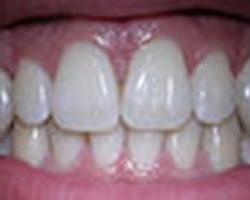Bulimia and Teeth
 Bulimia is an eating disorder characterized by bingeing and purging, often by vomiting in an attempt to control the body weight and relieve anxiety. It is a serious medical condition that can lead to a variety of negative outcomes and medical consequences. This article will focus specifically on bulimia and teeth.
Bulimia is an eating disorder characterized by bingeing and purging, often by vomiting in an attempt to control the body weight and relieve anxiety. It is a serious medical condition that can lead to a variety of negative outcomes and medical consequences. This article will focus specifically on bulimia and teeth.
There are many consequences that arise from the relationship between bulimia and teeth. By repeatedly regurgitating food, the oral cavity and teeth are exposed to stomach acid which erodes the enamel of the teeth as well as damages the oral mucosa. This can lead to discoloration of the teeth as well as cause them to be sensitive to heat and cold. As the bulimic cycle continues over time, teeth become more and more damaged. They can develop cavities as well as become infected, or even require extraction. Enamel erosion is generally greatest on the upper teeth surfaces facing the tongue.
Along with direct damage from exposure to stomach acid, bulimia and teeth are also intertwined because of the chronic inflammation caused by vomiting to the salivary glands. Swelling and inflammation of the salivary glands causes less saliva to be produced and leads to the oral cavity drying out. Saliva is protective of the teeth and without it teeth are more prone to infection, erosion, and cavities. Furthermore, bulimia and teeth affect one another because bulimics may be malnourished. This can lead to poor healing and an increased risk of peridontal disease.
Bulimics who are in recovery can work with their dentist to reverse some of the effects created by bulimia and teeth. For instance, in early stages of erosion, dentists may be able to restore a protective covering to the teeth via a composite resin or amalagam. If teeth have become too decayed, they may need to be extracted but can be replaced with a bridge or implant.
While in recovery, dentists can work with bulimics and teeth to lessen damage caused by relapses. A dentist may be able to provide a recovering bulimic with an appliance to protect the teeth from stomach acid during vomiting. In addition, he or she can provide fluoride treatments in the office, as well as fluoride mouthwashes or toothpastes to further strengthen the teeth. Dentists working with recovering bulimics may also recommend swishing water with baking soda in the oral cavity to neutralize stomach acid.
To supplement saliva, recovering bulimics may also be advised to drink plenty of water to keep the mouth moist as well as use a saliva subsitute. Over time, inflammation should decrease and saliva production should increase to normal levels.
Bulimia affects many of the body systems and can lead to devestating consequences, including death. Bulimia is a serious medical condition that requires proper treatment. One aspect of that treatment is bulimia and teeth. Bulimics in recovery can work with their dentist to restore their oral health and recreate a beautiful smile.
 Eating Disorder Self Test. Take the EAT-26 self test to see if you might have eating disorder symptoms that might require professional evaluation. All answers are confidential.
Eating Disorder Self Test. Take the EAT-26 self test to see if you might have eating disorder symptoms that might require professional evaluation. All answers are confidential.